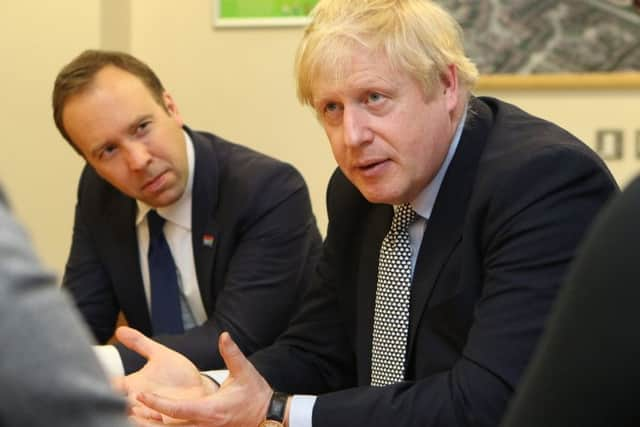Why social care scandal demands a fresh start by Tories and Labour – Tom Richmond


I’m sick to death of Health and Social Care Secretary Matt Hancock’s phoney promises on a Green Paper. Two years on from his appointment, and there’s no evidence that the document even exists.
Advertisement
Hide AdAdvertisement
Hide AdHancock’s obfuscation was self-evident this week. When Labour MP Barbara Keeley, among others, asked “when?”, it fell to Caroline Dinenage, a junior minister, to reply: “This year.” That was revealing. Not.


It’s the same with Hancock’s half-hearted law to guarantee the long-term funding of the NHS – it fails to recognise how shortcomings in social care provision are seriously compromising the day-to-day work of hospitals.
Advertisement
Hide AdAdvertisement
Hide AdBut Labour’s desire to oppose for opposition’s sake was also exposed by Thirsk and Malton MP Kevin Hollinrake. A genuinely consensual politician, he put Jonathan Ashworth – the Shadow Health and Social Care Secretary – on the spot about the merit of the social insurance premium proposed by two select committees.


Mr Hollinrake continued: “Will he agree to cross-party talks, and does he think that all those different options laid out in that report should remain on the table for discussion?”
The reply? Mr Ashworth said: “I appreciate the spirit in which he has made his intervention. We are not convinced that a social insurance model will work.”
Back to the Yorkshire MP who retorted: “Is it not the case that the best way forward is not to have a precondition about the subject of those talks, and that we should simply have a cross-party discussion?”
Advertisement
Hide AdAdvertisement
Hide AdBut Mr Ashworth was not having it. “The Government have no proposals whatsoever. They have been talking about bringing forward a social care plan for years now,” he replied. “MPs are more likely to see the Secretary of State riding Shergar at Newmarket than see a social care plan. If the Government want to put forward some proposals, we will always be happy to talk to them.”
Really? Whatever the Government say, or do, Opposition MPs like Mr Ashworth will look for excuses and abdicate their responsibilities to the 1.5 million adults now said to be received sub-standard social care.
Yet, with so little trust in Mr Hancock’s capabilities and Mr Ashworth’s position on hold until Labour appoints a new leader, it is time for some leadership.
Either Boris Johnson and the next Labour leader commit to appointing a Health Secretary – and Shadow Health Secretary – who are tasked with building a social care consensus.
Advertisement
Hide AdAdvertisement
Hide AdOr, if they don’t think this is possible, they should ask the respective chairs of Parliament’s Health and Communities Select Committees to take on the responsibility.
For, either way, doing nothing is not an option. Every day of delay simply makes it harder to come up with a prescription for reform that provides affordable – and sustainable – social care for all.
ON the subject of social care, I have misgivings that two senior figures from Theresa May’s administration have been chosen to head Parliamentary select committees.
The aforementioned Matt Hancock’s predecessor Jeremy Hunt, the longest-serving Health Secretary in history before becoming Foreign Secretary, is to oversee the Health and Social Care Committee and, presumably, inquiries into decisions taken on his watch.
Advertisement
Hide AdAdvertisement
Hide AdAnd Mel Stride, the Treasury minister who devised the controversial loan charge before becoming Leader of the Commons, is to head the very influential Treasury committee. This is the politician who blocks anyone on social media who dares to question, never mind challenge, his decisions.
The integrity of select committees is beyond reproach. This must not be put at risk by ex-ministers being tasked with marking their own homework.
TRANSPORT Secretary Grant Shapps had to renationalise the Northern rail franchise and deserves credit for his handling of the issue so far. However it will be self-defeating if the same senior managers who presided over this shambles of an operator transfer to the new Northern Trains organisation being set up by the DfT.
Even though some of the problems, like infrastructure improvements, were outside their control, they never commanded the confidence of staff, passengers – or local leaders.
Advertisement
Hide AdAdvertisement
Hide AdFINALLY, is there no limit to the notoriety of Chris Grayling – even six months after he left office? I refer you to question seven in the daily quiz in The Times on Monday: “Which Tory MP, and transport minister from 2016 to 2019, has the nickname ‘Failing’?
It still amazes me that the national media were so slow to pick up on his mismanagement of the railways here, first highlighted by The Yorkshire Post as long ago as the summer of 2017, and how it would have been better for the taxpayer – and also cheaper – to have paid Grayling to stay at home to do nothing.
And, as I became inundated with email welcoming the decision of Grant Shapps to strip Northern of its franchise, I noticed some came from organisations who were far from supportive of the stance that this newspaper started to take in 2017 on behalf of passengers when performance began to plummet.
No, the decision was not a cause for celebration, as some suggested. But it was a vindication of our accountability agenda – and it won’t stop until this region gets the transport infrastructure and investment that it needs.